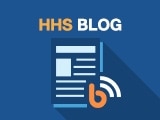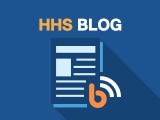#IAmHHS: Finding the Essence of Public Service in Making a Difference
As the Region III administrator for SAMHSA, the Substance Abuse and Mental Health Services Administration, I have the privilege of working with and serving the people of Pennsylvania, Delaware, Maryland, Washington, D.C., Virginia and West Virginia.
One of my main jobs is making sure that when there is a conversation about health, behavioral health is at the table. There was a time when that was not the case. But today we know that working collaboratively is a key success factor in reducing the impact of mental health and substance use disorders. Complex, public health problems can best be solved when the behavioral health needs of those we serve are considered.
My role in many ways is that of a “connector,” bringing state governments, academic institutions, foundations and other stakeholders together to find the best solutions. You do what the stakeholders in your states need you to do.
For example, we recently held a series of 13 meetings all over the state of West Virginia with a diverse array of public and private stakeholders to address the opioid epidemic. At the end, we brought everyone together to see what we learned, what’s working and how can we expand evidence-based treatment for individuals with substance use disorders.
What’s exciting is building upon those relationships, listening, connecting those who need help with experts and advocates who know what works, and being nimble enough to deliver resources and technical assistance.
But for me, making sure we work efficiently with our customers is in some ways just as important as the science underlying the recommendations.
After working across the six states in Region III since 2011 has shown me that solutions customized to meet community and state needs can help states improve their own systems. And adoption of solutions is more rapid when developed collaboratively with the stakeholder taking the lead. There are no cookie-cutter solutions.
Before joining SAMHSA, I served as senior adviser to the assistant secretary for administration at HHS. Beginning with Hurricane Katrina, I worked in Region VI for the assistant secretary for preparedness and response, and had the opportunity to lead public health and medical planning and response for Louisiana, Texas, Oklahoma, New Mexico and Arkansas. Prior to joining HHS, I served in the VA in San Francisco for five years.
I'm also a proud veteran, having served 20 years in the Navy Nurse Corps, retiring as a captain. I am honored to have served other veterans and their families in a variety of clinical and administrative roles, which were each enriching and rewarding.
When I left the Navy, I wanted to stay in government so I could continue to be of service and find new opportunities to connect people in need with resources and solutions. Every position in my career has had its unique challenges and that is certainly true today. But the reason I'm excited and positive is that almost every day I hear about individuals getting the help they need.
One patient now in recovery was asked what was it about his treatment program that enabled him to succeed. His answer: “My counselor knew what to say and what to do to keep me in the program.”
That's what keeps me motivated—being in an organization like SAMHSA that I know is making a difference.
The bigger the challenge, the better I like it. Why? To have the opportunity to have a bigger impact. That’s the essence of public service.
My name is Jean Bennett. I'm a veteran, a nurse and a regional administrator — and I am HHS.
Jean is one of more than 79,000 people who make HHS run every day. You can share her story and see others on Twitter and Facebook using #IAmHHS.
What You Can Do to ‘Prevent to Protect’ Against Birth Defects
Empowering Our Communities on the MLK Day of Service


